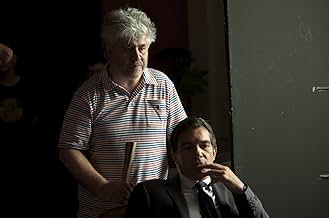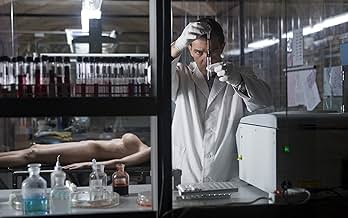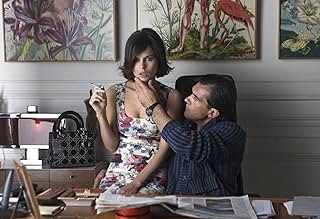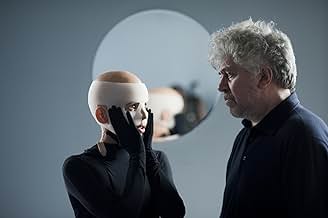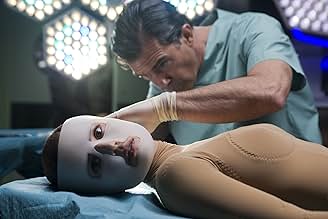Ein hervorragender Schönheitschirurg, der immer wieder von den tragischen Ereignissen seiner Vergangenheit heimgesucht wird, entwickelt einen synthetischen Hauttyp, der jeder Art von Beschäd... Alles lesenEin hervorragender Schönheitschirurg, der immer wieder von den tragischen Ereignissen seiner Vergangenheit heimgesucht wird, entwickelt einen synthetischen Hauttyp, der jeder Art von Beschädigung standhält. Sein Versuchsobjekt: eine geheimnisvolle und etwas sprunghafte Frau, die ... Alles lesenEin hervorragender Schönheitschirurg, der immer wieder von den tragischen Ereignissen seiner Vergangenheit heimgesucht wird, entwickelt einen synthetischen Hauttyp, der jeder Art von Beschädigung standhält. Sein Versuchsobjekt: eine geheimnisvolle und etwas sprunghafte Frau, die der Schlüssel zu seinen Zwangsvorstellungen ist.
- Regie
- Drehbuch
- Hauptbesetzung
- 1 BAFTA Award gewonnen
- 28 Gewinne & 69 Nominierungen insgesamt
Empfohlene Bewertungen
With that in mind, I'll keep this review short and will try not to give anything away. Antonio Banderas plays a rather unhinged scientist who is keeping a beautiful young woman prisoner in his home while using her as a human guinea pig for a new type of synthetic human skin. That's about as much information as you need. As the story unfolds, petal by petal in that flower-like way we've become accustomed to seeing from Almodovar, each scene adds wonder and flavour to an already robust set-up. Moving at a break-neck pace, not a frame is without beauty and not a second is wasted without pushing the story along. This screenplay is extremely polished and beautifully nuanced.
As usual, cinematographer Jose Luis Alcaine delivers beautifully vibrant visuals, but unlike other Almodovar films, this palette is decidedly less colourful, sticking mainly to Cronenbergian metallic colours fused with fleshy tones but with the odd gash of vibrant colour. It is as beautiful to behold as any other Almodovar film, but perhaps less garish.
In a film that relies on ambiguity in so many ways the cast here must be commended. Delicate balances are achieved by all concerned and it's wonderful to see Antonio Banderas settling into the rather unsettling role of Dr. Robert Ledgard. He exudes the same charisma and sexual bravura that made him famous but without the least whiff of sex symbol status coming through in the performance. He is creepy, strangely alluring and underplays the "mad scientist" bit admirably. Elena Anayas also impresses in a very challenging performance both physically and emotionally, both of which are perfectly effective as her story unfolds. A brilliant character who may not have been so impressive in the hands of a less capable actress. The camera intimately caresses her face and body throughout and she steadfastly rises to the challenge of being as beautiful a muse as a director could ask for.
It is unlikely that Almodovar will win over any new fans with The Skin I Live In but he will surely satisfy his already massive fanbase. A dark, thoughtful, frightening piece but never shying away from the heights of melodrama that Almodovar is known for, this sits beautifully on the line between Cronenberg at his best and a crazy soap opera.
Unique, Gothic and delightfully melodramatic! I love it!
http://charlenefilmblog.blogspot.com/2011/08/skin-i-live-in.html
Dr Robert Lesgard (Antonio Banderas) is a renowned surgeon who is attempting to achieve a breakthrough in bio-medical sciences by creating a synthetic skin through transgenisis. Classified as a horrific mutation by some, and acknowledged by Robert as an innovation, his experiments come at a price. His human test subject is a beautiful woman named Vera (Elena Anaya) who is contained within his home, and cared for by his head servant Marilia (Marisa Paredes). Vera is not like other women, she wears a skin-coloured suit made out of fabric instead of clothes, she is constantly watched by Robert and Marilia, and she never leaves her room, which only Robert himself holds the key too. What follows is a startling journey of discovery as the narrative unravels a story of disturbing past, present and future events; transforming the lives of all those involved.
Beginning in Toldeo in 2012, Almodovar utilizes a constantly underused and under-appreciated device in the nonlinear narrative. He provides the audience with one perception of each character before returning in flashback during the second act to six years previously where further events are explained and through this, the audience's initial observations of the characters become undermined and drastically altered. He then digresses between past and present at will building a comprehensive picture of each character involved as the story develops revealing some startling and disturbing discoveries. This decision to structure the film in this way, also adequately supplements Almodovar's need to explore his key themes including sexual identity, and the nature of the moral of ethics of the human soul after it has been literally stripped bare.
Coupled with the beautiful cinematography from Almodovar's long-time collaborator Jose Luis Alcaine and an original and complimentary score by Alberto Iglesias, 'The Skin I Live In' also becomes an example of technically proficient filmmaking which works alongside the performances of the likes of Banderas and Anaya, as well as the slickly written script which keeps the audience on their toes until the final curtain has been dropped. Pedro Almodovar is undoubtedly one of the most successful auteurs of the last few decades, and with 'The Skin I Live In' he shows that he can almost touch upon a new genre, in the form of body horror genre-hybrid, whilst also retaining all the previous elements, themes and techniques which have made his films the deep-seated critically successful films that they are.
The structure here is one of it's more interesting aspects and yet another film this year that isn't told in a strictly linear fashion. We first meet Doctor Robert Ledgard (Antonio Banderas) in the present day, as he works tirelessly on perfecting a new skin for his subject, the young and beautiful Vera (Elena Anaya). Almodovar establishes us in this present day world, complete with a very Almodovar subplot (a man in a tiger suit comes to the house and brings some trouble) and a lot of baggage for Ledgard. We get to know these people, become intrigued by what brought them to their current state and that we jump back six years to explore this character further.
It's a surprising jump and I must admit that it got me off guard at first, but as we spend more and more time in the past building up to the present I slowly came to terms with what Almodovar was doing. He gave us a stake in the present day world so that when he took us into the past it becomes about more than just laying out the facts. We already have a perception on Ledgard and a curiosity into understanding the events that bring him to where we met him, so the film becomes as much of a fascinating game of putting these puzzle pieces together as it is a character study and all-around masterwork of high drama.
Slowly the pieces start to come together and I found myself constantly trying to figure out what happened in this world, how these events in the past connect to the present day we were introduced to. When we finally get our answer...stunned...amazed...jaw-unhinged...none of these words can even begin to describe what happened to my mind. This is a twist that doesn't exist for shock value by any means but absolutely sent me to the floor, one of the most shocking and unexpected moves in cinema history as far as I'm concerned. It threw me for a major loop and everything I had come to perceive about these characters and their world was altered in an instant. Everything became a thousand times more fascinating and complex with the use of one simple word.
As I said before, this is a piece of the most miraculous and bold high-drama, a world where anything is possible but nothing feels out of place. That is perhaps the most shocking aspect of the film itself, that Almodovar gives us a story filled to the brim with melodrama but none of it feels contrived or too weird or too much. Everything feels totally natural and believable in the world that Almodovar establishes for us. His ability to make this happen is nothing short of extraordinary. Of course he doesn't do it alone and there are a lot of other aspects to the film that contribute to making it work on every conceivable level, to bring us into this incredible world.
Of course there are the performances, which are just a dream on their own. I've never been a fan of Antonio Banderas and I've honestly been hesitant to watch films just based on his involvement, but he delivers something here that I never knew he was capable of. Ledgard is an incredibly difficult character to pull off because our perception of him changes drastically throughout the film, but Banderas masters it without a single hitch. There was never a false move, never a moment where I didn't believe this character was capable of doing what he was doing. He is charming, intelligent, deranged and intimidating, unfolding layer after layer as we go on. It's a remarkable achievement in both character and performance. The other performances work very well to support Banderas and Almodovar's work here, particularly from the absolutely gorgeous Elena Anaya. She is all things sympathetic, manic, intriguing and sensual and when we come back to the present day after understanding what brought her to this place, she takes on a whole new life of internal chaos and complexity. For all of her outward expression it becomes a very internal performance and she is sensational here.
The technical aspects are all on key, all of them impressing without taking the spotlight away from the story, but the one thing that really left a mark was the phenomenal score. If it wasn't for Hanna, this score would be a runaway victory for my personal win right now. Rarely have I seen music so well-utilized for the atmosphere a director strives to establish. The high-wire drama meets it's ally with this music, a soaring operatic work that brings us into this world so completely. It swept me away and completely engulfed me in this world that Almodovar established. The score is a perfect fit for the film because it captures exactly what the overall product is; a brilliant and original opera of miraculous proportions. This is one of those films that I wasn't expecting a lot from and it just blew me away at every level.
Antonio Banderas is so terrific as the leading man, he hasn't looked this great in screen in a long time, I think he seems more at home in his native language, and Elena Anaya is absolutely radiant on the big screen, her face just lights up the screen and she is absolutely exceptional in a very strange role. The story is really a bizarre one, it's seems like a less perverted De Sade and a more understandable David Lynch, it always takes you by surprise and it is highly original and also somewhat daring I think, and thank god a director like Almodovar decided to film it and not some silly director.
The cinematography and music is beautiful, the colours and textures in the film are picked up beautifully by the camera and the music is a great companion to each scene, it's so close to perfection in the production design department that i would go so far to say as I haven't seen a better looking film this year.
This movie is in my opinion the least accessible of all of Almodovar's films but I hope it doesn't put people off, as his touch and style is clear and present here. It's very different, strange, perverted, horrific, beautiful and always entertaining.
Enjoy :)
The order in which the events of the story are told is a cunning device that allows the director to make us reflect on how superficially - indeed, skin-deep - we perceive reality and how quick we are to judge first impressions and jump to conclusions. What we first perceive one way, those initial scenes that slightly baffle us but which we nevertheless do not hesitate to judge in a specific way, take on a completely new meaning when the story pauses to take us back into the past in order to tell us about an important series of events that happened at the time which bear a direct relation to present events. The new light that is shed on the present changes completely our perception of the story as we had first witnessed it, which is a humbling experience. We are then taken back again to the present and continue watching the rest of the film, but with this completely new understanding of the real underlying motivations for the characters' actions. It is at this point that through a slight thriller-style twist in the plot the story takes on a Shakespearean dimension as it delivers its powerful humanist lesson that vengeance begets vengeance.
Food for thought, in fact enough food to last you days and feed other people, as you are left on the one hand wondering at the concept of skin: what we actually desire when we desire someone, whether all desire is skin-deep, whether the skin does not allow us to see the person behind. And on the other hand you are left with the reflection on how the road of vengeance leads only to self-destruction. When a film leaves you pondering so deeply, I can only conclude it is a great film.
Wusstest du schon
- WissenswertesAfter a few days of shooting, Pedro Almodóvar had a conversation with Antonio Banderas in which he told Banderas that he needed to drop all of his tics as an actor, because the director wanted a really restrained character and the actor was playing him in a more typical psycho way.
- PatzerWhen Doctor Robert Ledgard and his colleagues are preparing themselves for surgery, they fasten each other's surgical gown from the back, contaminating their sterile gloves.
- Zitate
Profesora de Yoga en TV: There's a place where you can take refuge. A place inside you, a place to which no one else has access, a place that no one can destroy.
- Crazy CreditsAt the start of the end credits, there is a rotating DNA double helix in the background.
- VerbindungenFeatured in At the Movies: Cannes Film Festival 2011 (2011)
- SoundtracksPor el amor de amar
(Versión Castellana)
Written by Jean Manzon and José Toledo
Performed by / interpretada por CONCHA BUIKA (Buika), al piano Iván González Lewis (as Iván 'Melón' Lewis)
© 1960, by Jean Manzon & Jose Toledo.
Autorizado para todo el mundo a Universal Music Publishing, S.L.
Todos los derechos reservados.
Grabado en CATA (Madrid).
Top-Auswahl
Details
- Erscheinungsdatum
- Herkunftsländer
- Offizielle Standorte
- Sprachen
- Auch bekannt als
- La piel que habito
- Drehorte
- Produktionsfirmen
- Weitere beteiligte Unternehmen bei IMDbPro anzeigen
Box Office
- Budget
- 10.002.914 € (geschätzt)
- Bruttoertrag in den USA und Kanada
- 3.185.812 $
- Eröffnungswochenende in den USA und in Kanada
- 223.119 $
- 16. Okt. 2011
- Weltweiter Bruttoertrag
- 33.716.389 $
- Laufzeit2 Stunden
- Farbe
- Sound-Mix
- Seitenverhältnis
- 1.85 : 1
Zu dieser Seite beitragen


![Tráiler [OV] ansehen](https://m.media-amazon.com/images/M/MV5BODliMDVlYjQtN2U1OC00MGVlLWE5YWEtNDk5OTMzMGZkOGFhXkEyXkFqcGdeQXRodW1ibmFpbC1pbml0aWFsaXplcg@@._V1_QL75_UX500_CR0)





